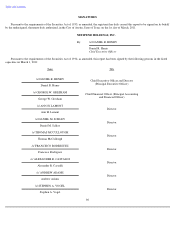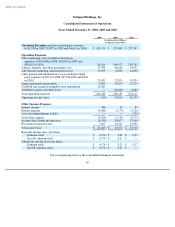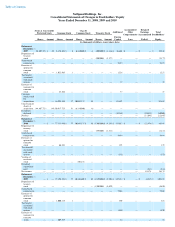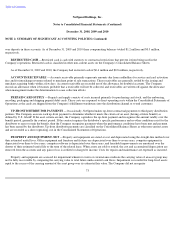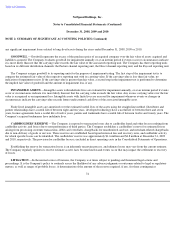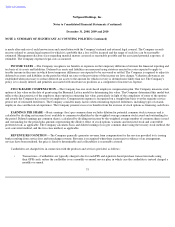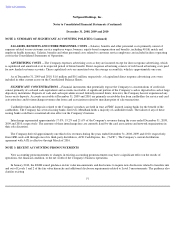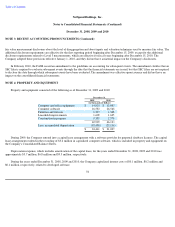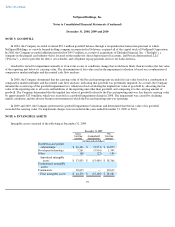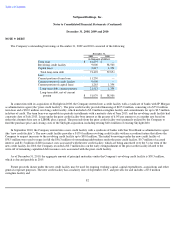NetSpend 2010 Annual Report Download - page 78
Download and view the complete annual report
Please find page 78 of the 2010 NetSpend annual report below. You can navigate through the pages in the report by either clicking on the pages listed below, or by using the keyword search tool below to find specific information within the annual report.
Table of Contents
NetSpend Holdings, Inc.
Notes to Consolidated Financial Statements
December 31, 2008, 2009 and 2010
NOTE 1: ORGANIZATION AND BUSINESS
NATURE OF OPERATIONS —NetSpend Holdings, Inc. ("NetSpend" or the "Company"), based in Austin, Texas, was formed as a
Delaware corporation on February 18, 2004. It was formed in connection with the recapitalization of one of the Company's current subsidiaries,
NetSpend Corporation, which was founded in 1999. The Company operates in one reportable business segment to provide general
-purpose
reloadable ("GPR") prepaid debit cards and alternative financial service solutions to underbanked consumers in the United States. The
Company's products empower underbanked consumers to become "self-banked" by providing FDIC-insured depository accounts with a menu
of pricing and features specifically tailored to their needs. The Company has built an extensive distribution and reload network comprised of
financial service centers and other retail locations throughout the United States.
The Company is an agent of FDIC-insured depository institutions that serve as issuers of the Company's products. The Company has
agreements with Meta Payment Systems, a division of Meta Financial Group ("MetaBank"), Inter National Bank ("INB"), U.S. Bank, and
Sun Trust Bank (collectively, the "issuing banks") whereby the issuing banks issue MasterCard International ("MasterCard") or Visa USA, Inc.
("Visa") branded cards to customers. The Company's products may be used to purchase goods and services wherever MasterCard and Visa are
accepted or to withdraw cash via automatic teller machines ("ATMs").
The Company's common stock trades on the NASDAQ stock exchange under the symbol "NTSP."
PRINCIPLES OF CONSOLIDATION —The accompanying consolidated financial statements include the accounts of NetSpend
Holdings, Inc. and its wholly owned subsidiaries, NetSpend Corporation, Skylight Financial, Inc. and NetSpend Payment Services, Inc. All
intercompany transactions have been eliminated in consolidation.
USE OF ESTIMATES —The preparation of the consolidated financial statements in conformity with accounting principles generally
accepted in the United States of America ("U.S. GAAP") requires management to make estimates and assumptions about future events. These
estimates and assumptions affect the reported amounts of assets and liabilities and disclosure of contingent assets and liabilities as of the date
of the consolidated financial statements and reported amounts of revenues and expenses during the reporting period. Among the more
significant assumptions are those that relate to the valuation of goodwill and intangible assets, cardholders' reserve, legal contingencies, and
stock-based compensation. These accounting estimates reflect the best judgment of management. Actual results could significantly differ from
management's estimates and judgments.
NOTE 2: SUMMARY OF SIGNIFICANT ACCOUNTING POLICIES
CASH AND CASH EQUIVALENTS —The Company considers cash invested in interest-bearing deposits and short-term investments
with original maturities of three months or less at the date of purchase to be cash equivalents.
The Company has established compensating balances at certain of its issuing banks to offset overdrawn cardholder accounts. Some of
these compensating balance accounts are included in the Consolidated Balance Sheets as cash and cash equivalents because there are no
contractual restrictions
72




